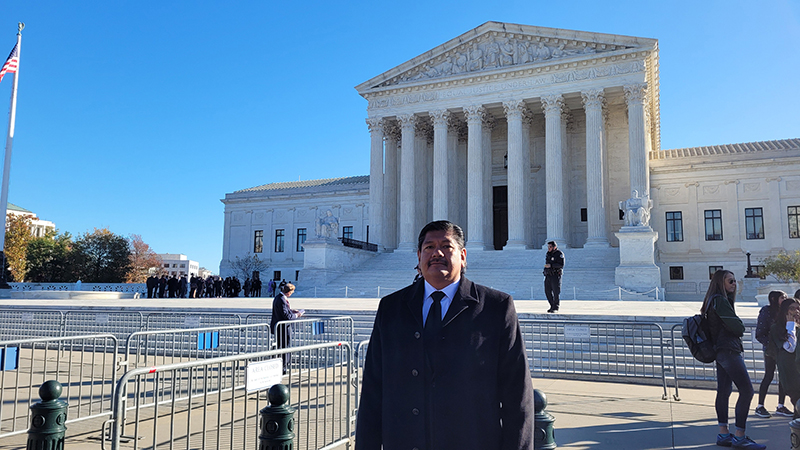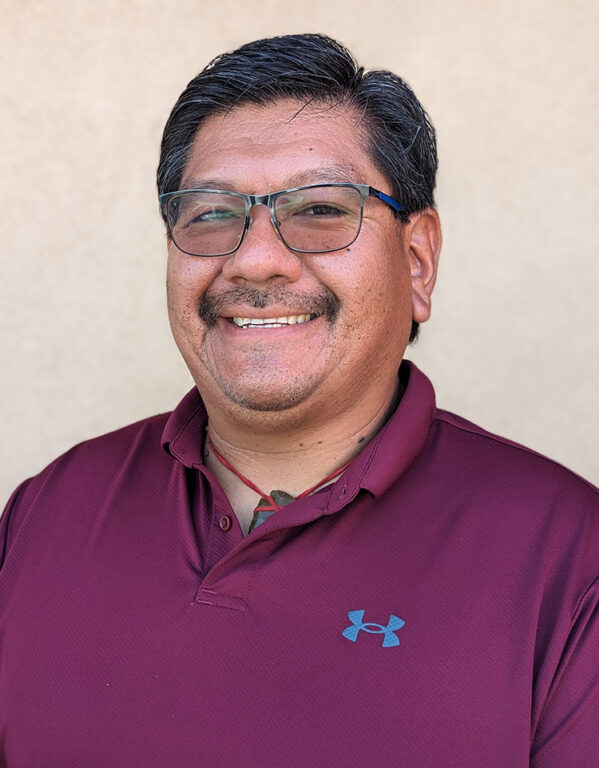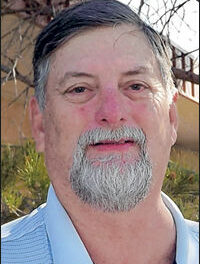WASHINGTON, D.C. — Knowing nothing is settled, not even federal law, when a 1978 law enacted to prevent Native children from being separated from their families and communities was challenged in the U.S. Supreme Court, a former Pueblo of Isleta governor knew it’s reversal could have serious consequences.
As foster parents, Vernon Abeita and his wife, Christina, took in children from the Isleta Pueblo for many years.
“My wife and I, we’ve always tried to help kids on the pueblo. Our house was always busy with kids,” Abeita said. “As the years went on, we didn’t like the processes that were happening within social services. We voiced our concerns and kind of stepped back.”
When Abeita was elected governor of Isleta in 2021, Jacqueline Yalch, the new Isleta Social Services director, provided regular updates on the department to the council and governor. One update that piqued the then governor’s interest especially was the 2020 Kevin S. settlement.
The case was filed in the U.S. District Court in New Mexico in 2018. The suit, which was brought against the state’s Children, Youth and Families Department and Human Services Department, argued the state had failed to allocate its resources to develop a trauma-informed system of child welfare. The settlement set a number of specific and ambitious targets that CYFD and HSD agreed to achieve in the coming years, as well as certain provisions for Native children.

Submitted photo
Vernon Abeita, the former governor of the Pueblo of Isleta, traveled to Washington, D.C., in support of the landmark case which keeps Native children from being place outside their communities.
“We always want to keep Native kids with the families, and if not the families then the villages or pueblos they come from,” Abeita said.
In the event a child is placed outside of their pueblo or tribe, they are often placed with other Native families, in communities with different traditions, he said.
“Let’s say a pueblo kid goes up to the Navajo Nation and they go through the system. There are traditional healings, and say they want something like that. When they drafted the settlement and then the court process, those traditional pieces were in it but they did it in a blanket way,” Abeita explains. “So they followed one (traditional) system. Pueblos have our own system of doing traditional stuff that’s sacred to us.
“So now they are trying to get this kid back to his home, but the system, this blanket system, says you have to tell us exactly what you’re doing. That’s not going to happen.
“I understand it’s a Native kid but it’s not a Native kid that believes in that system. We have to be able to give this kid the ceremony for where he or she is from.”
During a meeting of the All Pueblo Council of Governors and New Mexico Gov. Michelle Lujan Grisham, Abeita raised the issue.
There are hundreds of pueblos, tribes and reservations nationwide, 23 alone in the state of New Mexico, Abeita noted, “so you can’t make this a blanket deal across the board.”
With the Kevin S. settlement requiring the state to create a law that mirrors and expands on the federal Indian Child Welfare Act, the time was right to craft the state Indian Family Protection Act.
The governor signed the legislation in March 2022, just after the U.S. Supreme Court agreed to take up a case out of Texas that challenged ICWA.
With Native children in New Mexico better protected, Abeita and countless other advocates from pueblos, tribes and reservations across the country traveled to Washington, D.C., last November to support upholding the law.
“If it was overturned, the other states with pueblos and nations didn’t have any protection,” he said. “We were there to support and advocate, express our concerns. It was powerful; it was awesome to be there.
“It allows sovereign nations to keep their children. It was something the government saw, that we have our own systems, we have our own traditions, we have our own way of government.”
In 1864, President Abraham Lincoln recognized the power of the New Mexico pueblos through 19 silver-tipped “canes of power.”
“That was a sign from the United States government that tells us we rule over our own people, that we can lead our own people,” he said.
During a pueblo governors’s term, he or she holds the cane and keeps it in their home, an experience Abeita described as beautiful.
“The U.S. government realized that we are different. We have our own ways of doing things before the U.S. government came, before it was actually here,” he said. “It’s unfortunate that Native Americans, as a whole, are losing our culture. We want to be able to still give these traditions to our kids.

Vernon Abeita and his wife, Christina, have been foster parents for many years, taking in children for Isleta Pueblo.
“A lot of our customs and traditions aren’t written, they’re not recorded. They are passed on from generation to generation by mouth. That’s why we want to keep our kids together.”
The challenge of maintaining continuity of traditions and culture is compounded when Native children are placed outside their communities.
“What makes it difficult for a Native American kid to be raised outside of the pueblo customs is if they try to re-enter, that is almost impossible,” the former governor said. “We hold our secrets close, our customs and ceremonies specifically. So if you have a person who was living outside of the pueblo who found out in their 40s they are Native American and they want to come back in and learn, it’s like bringing in a non-native honestly.”
Calling the court’s decision in June “the right thing,” Abeita said having ICWA overturned would have left a huge number of Native communities without protection.
“There are only five or six states that have their own laws,” he said. “If they had overturned it, what’s the next thing? They’re going to hit our sovereignty? That was another reason we had to go and fight this. I honestly think, if it had been overturned, our tribal sovereignty would be next, to see if sovereignty is one of those things we should continue to have for Native Americans.”
Julia M. Dendinger began working at the VCNB in 2006. She covers Valencia County government, Belen Consolidated Schools and the village of Bosque Farms. She is a member of the Society of Professional Journalists Rio Grande chapter’s board of directors.

















